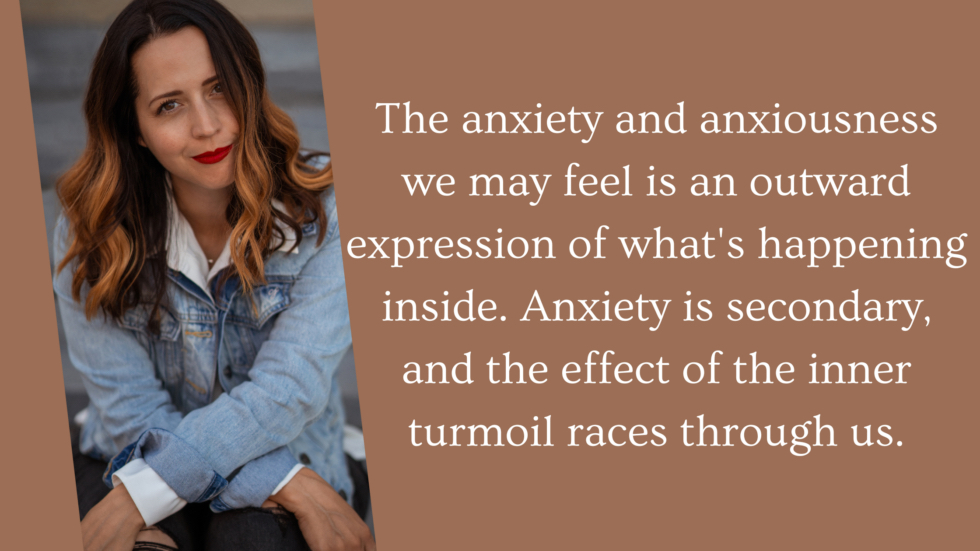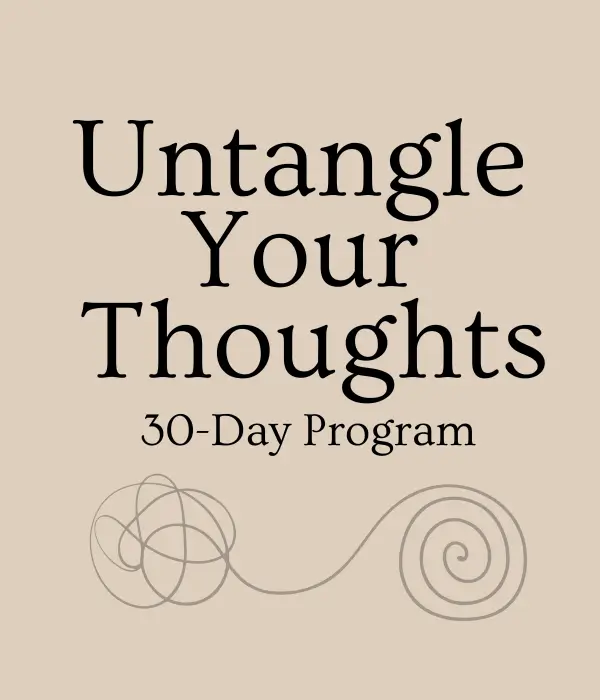The depth at which we know God is the depth at which we will be able to trust God. Overcoming anxiety isn’t about pushing away your feelings, ignoring them, or treating what you are going through like nothing. Overcoming anxiety hinders on our ability to trust God with our hearts, pain, concerns, situation, and justice.
The body is constantly communicating, telling you something. Tense muscles, rapid heartbeat, shallow breathing, sweating, and constant fidgeting are a few signs and ways our bodies are telling us it’s perceiving a threat. When our bodies perceive a threat or stress of any kind that can trigger our anxious feelings, what happens next is our bodies’ fight-or-flight response kicks in and begins to take care of us according to the information it is receiving. In other words, our bodies are trying to get our attention and tell us something. Will we listen?
With the fast pace of this world, it’s no wonder we are finding ourselves in a constant state of anxious feelings. We feel there is no time to slow down and appropriately respond to the situations and things happening to us and around us. We think to ourselves we will deal with it later until later never comes, and we find ourselves lying awake at night trying to process everything all at once. A time when everything seems to sink in without noise or distractions. A time we usually want to escape from – silence with our own thoughts. It’s no wonder we have an anxiety epidemic.
By the way, what if I told you your feelings aren’t inherently bad or sinful? You don’t need to fear or suppress them. They can be a guide. If you’re interested, I have a free 3-day study on living by faith while processing emotions. Check it out here!
The Difference Between Stress and Anxiety
What is the difference between stress and anxiety? How do we know if it’s just stress we are dealing with or anxiety? Let’s look at it this way. Imagine stress and anxiety as unwelcome guests in your house. Stress is like a temporary visitor who knocks on your door, bringing extra responsibilities or challenges. It might make you a bit busy or overwhelmed, but eventually, it leaves when the situation gets better.
On the other hand, anxiety is more like a persistent guest who overstays their welcome. It’s as if anxiety has settled in, making you feel uneasy and on edge even when there’s no immediate threat. While stress is a response to external pressures, anxiety tends to linger internally, creating a sense of worry and fear that can stick around longer than you’d like. Therefore, overcoming anxiety doesn’t just go away without dealing with the root issue.
In this analogy, stress is a short-term guest, and anxiety is a more persistent, long-term visitor that requires extra attention and care to manage and eventually ease out of your “house” or life. Therefore, stress is a response to an external cause, such as arguing with a friend or work deadlines. It will go away once the situation is resolved. Stress can be positive or negative, encouraging us to meet a deadline or causing us to lose sleep.
However, anxiety is generally internal, meaning it’s our reaction to stress (National Institute of Mental Health). The feelings never seem to go away; they linger even when the situation is resolved. Both can affect our bodies the sam
Anxiety in Your Body
In order to care well for our bodies, we need to work to recognize normal stressors from anxious feelings. With anxiety, feelings of persistent dread and worry are present even when the threat is gone. There’s not something to fear, but we interpret it that way. Overcoming anxiety will take time as we learn to walk through the healing process in our bodies.
Therefore, our bodies activate, and this activation takes place in the brain. When anxiety is present, and we are interpreting a threat that may not be real, the part of your brain that is responsible for reasoning, decision-making, planning, and sound judgment shuts down. When we’re triggered (our bodies believe there is a threat), is when our brain sends signals to our amygdala, the fear center of the brain, quicker than it goes to the frontal lobes – the thinking and planning center.
We can even begin to feel it physically with fatigue, tight shoulders, and headaches. While these things are common, this should not be our normal way of living.
This is why we can not simply throw scriptures at ourselves about stress and anxiety and hope it all goes away. The event, situation, or trauma happened to all of you emotionally, spiritually, and physically. God’s transformation works from the inside out, not the outside in. He works from the spiritual to the natural. Jesus tells us to abide in the vine, to renew our minds, and to train ourselves in godliness. We use our whole bodies to find wholeness with Him.
Overcoming Anxiety
As we think about the challenges faced by people in the Bible, it’s clear that stress is something everyone deals with. Today, we often find ourselves grappling with anxiety, which is a close companion to stress. Like people in the Bible felt stress, we, too, feel the weight of anxiety in our lives. Yet, just as they discovered strength and hope in their struggles, we can learn from their experiences and find ways to navigate the complexities of anxiety in our own lives. Let’s take a closer look now at anxiety. What is it, and how does it impact our lives?
Anxiety is a response to stress (Ross, 2018). I like to consider anxiety a secondary emotion. Another word for that might be more of a reaction than a feeling or a primary emotion. Anxiety is like a backup emotion that shows up when we feel other strong emotions like fear, sadness, or anger.
Imagine it as a warning signal telling us there might be something challenging ahead. It’s our mind getting ready to deal with tough situations or uncertainties. So, anxiety is like a response to those first feelings, helping us get ready to handle whatever comes our way. To overcome anxiety, we want to pay attention to what feelings are lingering around longer and no going away.
Anxiety acts as a protective mechanism, alerting us to potential threats and preparing us to cope with or avoid adverse outcomes. It can be seen as a natural response that helps mobilize cognitive and physiological resources to deal with stressors. Understanding anxiety as a secondary emotion highlights its connection to underlying feelings and the intricate ways our emotional responses unfold. In short, anxiety is your body’s reaction to stress and can occur even if there is no current threat.
Anxiety is a symptom and not a root. Can anxiety be the root of physical discomfort? Yes! Remember, though, there is a root that causes anxiety, and that anxiety causes physical discomfort.
Practical Ways to Overcome Anxiety
These are just a few ways we can begin to work through our anxious feelings.
Reduce Caffeine Intake: Caffeine is a stimulant that can increase heart rate and contribute to feelings of restlessness and nervousness. Cutting back on caffeine can help regulate your energy levels and reduce symptoms of anxiety.
Move Your Body Every Day: Physical activity has been linked to the release of endorphins, the body’s natural mood lifters. Regular exercise can also improve sleep quality, reduce stress hormones, and enhance overall well-being, providing a natural way to manage anxiety.
Ensure Adequate Caloric Intake: Proper nutrition is essential for maintaining physical and mental health. Inadequate calorie intake can lead to imbalances in neurotransmitters and energy levels, potentially exacerbating anxiety symptoms. Eating a balanced diet ensures your body receives the nutrients it needs to function optimally.
Something I work through with all of my coaching clients is that there are three main contributors to our health: physical, spiritual, and emotional health.
Is Overcoming Anxiety Merely Memorizing Scripture
The word of God is clear about how to handle our cares, what to do with them, and how to get through feeling anxious.
However, I want to discuss something that is even more important. I want us to think about these two questions:
- What do you believe about God?
- What do you believe that God believes about you?
Get my Untangle Your Thoughts program to go more in-depth with this topic.
It’s hard to “cast our cares on God” when we don’t think God cares. We can say those things, but do we believe in our heart He does?
There are times when we allow what we feel to dictate what is the truth.
For example, I know God says He will never leave me, but why do I feel like He has? When we feel something like that, it is quite often that we have left God.
No, it’s also becoming embodied with the word and living it out in our daily lives. Our habits are formed around what we love. What we love drives our habits. Therefore, we ask ourselves, what do we love that is driving these habits?
I know these feelings because I have lived them and will go through them depending on the season of my life. When I start to feel a specific way, I try to get in the habit of asking myself, “Do I trust God here?” This allows me to address and be gentle with the situation.
We will never be able to comprehend the depth of God’s love for us, but we can start with learning to receive and live in His love one inch at a time.
Psalm 55:22 says, “Cast your cares on the Lord and he will sustain you; he will never let the righteous be shaken.”
This is a promise from God. One that we can trust about His character and nature. He will sustain us, and we do not have to be shaken. It doesn’t mean we won’t be shaken. This means we don’t have to live shaken.
Overcoming anxiety starts with knowing who God is to you and what you believe He believes about you.
There are many different aids, supplements, workouts, foods, and therapy that can help. Still, without our sustaining power of Christ, our character doesn’t change; everything else is just bandages covering up a wound that cuts deep.
We can read the word of God and live it out practically, which also, at the same time, helps our nervous system to calm down.
My Untangle Your Thoughts program would be great for you if you want to learn how to do this more practically.





